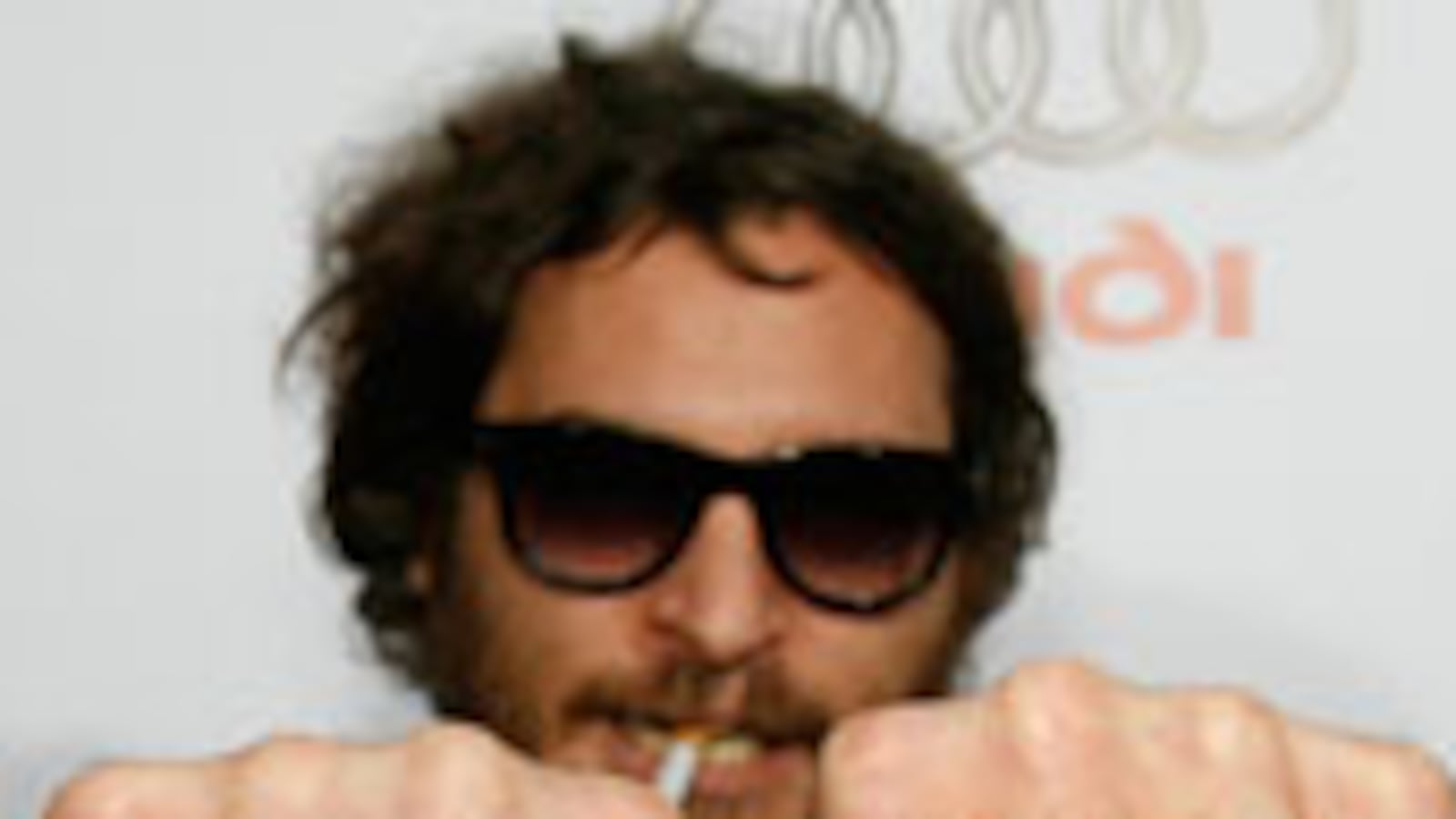
Joaquin Phoenix has always been a stellar actor. But the nature of his talent has never been more apparent than during the last two years when, beginning with his legendary interview with David Letterman, the clean-shaven two-time Oscar nominee committed himself wholly to making every public appearance a painstaking portrait of an emotional breakdown. Give Phoenix credit: Journalists everywhere (myself included) actually pondered whether his shaggy beard, and his preposterous foray into hip-hop, was something more than a practical joke.
Now comes the trailer for his forthcoming documentary, I’m Still Here: The Lost Year of Joaquin, which hit the Internet last week. It’s the best evidence yet that the actor—with the help of his brother-in-law Casey Affleck—was pulling a full-on Andy Kaufman on the American public. In the trailer, we see Phoenix playing a reluctant celebrity—despondent in the back of a limo, alone under the spotlight in a vacant theater, bare-chested in profile, all while some craggy-voiced mystic intones enigmatic metaphors about success. “Life’s a journey that goes round and round,” the mystic says, “and the end is closest to the beginning.”
Shepard Fairey said the new movie convinced him that Phoenix is “definitely a brilliant and troubled mystery.”
Whatever that means. Clearly, ambiguity is what drives this endeavor. But the premise is so ridiculous that any serious consideration is rendered moot, almost immediately.
As if signaling the final stretch of this marathon, artist Shepard Fairey released portraits of Phoenix-in-crisis that started turning up around New York, Los Angeles, San Francisco, Boston, and other cities. They are black-and-white illustrations of Phoenix in profile, dark sunglasses in place, his hair a nest of despair. Fairey last weekend told The Daily Beast the new movie convinced him that Phoenix is “definitely a brilliant and troubled mystery.”
“I think both my image and the film inspire audience projection in the vein of a Rorschach test,” Fairey wrote in an email. “The audience reaction supplements, and is an important part of, the film. The psyche of the protagonist is very much intertwined with the psyche of the audience." Meaning that what we think of Phoenix and his shenanigans is a reflection of our own experience, and not the actor. But even that is a pretty high-minded view of what everyone has suspected from the get-go was an interminable hoax.

(Perhaps, this is a good place to mention that Affleck and Phoenix have matching circle tattoos that mean literally “nothing.”)
The movie, which opens Sept. 10, marks Affleck’s directorial debut and was filmed during Phoenix’s 2008-2009 press tour for his last film, Two Lovers, a critically acclaimed indie drama co-starring Gwyneth Paltrow and Vinessa Shaw. The instant this all started, Affleck stood stone-faced next to Phoenix, tellingly, the night before Phoenix’s birthday, on a red carpet, during an impromptu interview with the syndicated celebrity tabloid show Extra.
“I want to take this opportunity,” Phoenix half-mumbled to reporter Jerry Penacoli, “to give you an exclusive. This will be my last performance as an actor. I’m not doing films anymore.”
When Penacoli laughed in his face, Phoenix looked wounded, and in a small voice asked, “Why are you laughing at me?” Then he stormed off. It was a moment rife with melodrama, casting Phoenix as the misunderstood artist caught in the crossfire of vapid celebrity journalism.
By January 2009, Phoenix’s efforts grew more elaborate. Amateur video started turning up online showing Phoenix on his hip-hop tour, doing a pratfall off the stage at one appearance. At another, he leapt into the crowd to pummel a Miami Beach heckler, shouting, “I’ve got a million dollars in a fuckin’ bank account! What you got, bitch?” Perhaps the grainy YouTube footage was an attempt to lend something underground and authentic to Phoenix’s efforts. But it still felt like an inside joke that we were all in on. For his part, Phoenix looked like he was having a ball.
Then, February 11, 2009, came that infamous appearance on The Late Show With David Letterman, during which Phoenix seemed incoherent, sticking his gum under Letterman’s desk, and staring into space. The audience laughed all the way through it. Phoenix himself seemed to struggle to keep a straight face. And the instant Letterman called for a commercial, Phoenix leapt up, lifted his sunglasses, and said something quickly to the talk-show host as if thanking him for going along with the bit, as Letterman had for Andy Kaufman and others.
Joaquin Phoenix Acts Strangely on Late Show with David Letterman
Of course, that didn’t stop earnest speculation from some quarters that it wasn’t an act and that maybe Phoenix had lost his mind. Celebrity addiction specialist Drew “Dr. Drew” Pinksy told RadarOnline.com that he had “grave concerns” about Phoenix’s mental health after watching him on Letterman. But as evidenced by Ben Stiller’s spoof during the Oscar telecast that year, everyone else in Hollywood considered the whole affair an elaborate sight gag.
“It was like a performance,” Paltrow told an ITN reporter during the Two Lovers junket. “It was so brilliant.”
So far, everyone associated with the movie, from the agents who finalized distribution rights to Magnolia Pictures in July to the publicists charged with selling this puzzling film, are keeping mum about its true nature. After a private screening last spring, prospective film buyers told the Los Angeles Times they were shocked by scenes of Phoenix snorting cocaine off the breasts of a prostitute and having oral sex with a publicist.
It seems the rock star revelry Phoenix and Affleck perpetrated in the movie—whether genuine or feigned—may have spilled over into real life. At least, that’s what producer Amanda White and cinematographer Magdalena Gorka suggest in their dual lawsuits against Affleck for sexual harassment.
Phoenix himself isn’t expected to promote the movie as of yet, preferring for now to let the bizarre work speak for itself. (Though Magnolia Pictures chief Eamon Bowles told Deadline.com that the star would be speaking about the movie “in some capacity.”)
But he seems to be clean-shaven and lucid again, appearing in public-service announcements for animal rights and suicide prevention ( alongside Miley Cyrus). Aside from an occasional strip-club foray, Phoenix appears to have tabled his hip-hop aspirations. He recorded an album with Sean “P. Diddy” Combs but there’s no indication that the album will actually be released. And if he was experiencing emotional tumult in 2009, no high-profile spin-doctor or rehab vacation was apparently necessary. As breakdowns go, this appeared to be strictly for entertainment purposes only.
It was an ambitious undertaking, whatever the aim. Though it’s likely Phoenix could have achieved the same degree of notoriety in half the time. Actor-turned-performance artist James Franco, for instance, got about an equal amount of mileage out of just a short stint on General Hospital. One thing is sure, though. We’ll all be watching for Phoenix’s next move. Perhaps that was precisely the point.
Gina Piccalo spent a decade at the Los Angeles Times covering Hollywood. She's now a contributing writer for Los Angeles Magazine and her work has appeared in Elle, More and Emmy. She can be found at ginapiccalo.com.






